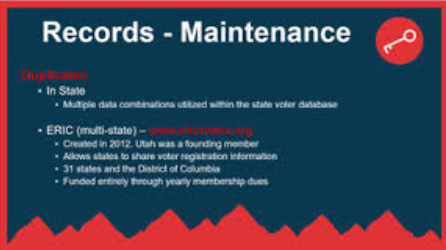Why Hidden Algorithms in State Board of
Election Voter Rolls Disqualifies Certification

Article Published
by Jerome R. Corsi, Ph.D.
Andrew Paquette, Ph.D.
Those who want to diminish the importance of finding cryptographic algorithms embedded in state boards of election (SBOE) voter registration databases typically demand proof the algorithms have resulted in fraudulent votes or suggest that legitimate purposes can explain the algorithms. However, they’re focusing on the wrong things.
This article argues that cryptographic algorithms in SBOE voter registration databases may violate state and federal laws, potentially indicating improper practices or even criminal activity. Election officials who fail to investigate and address unauthorized algorithms once discovered could risk civil and possibly criminal liabilities, depending on specific circumstances and applicable laws.
Consider the following legal requirements that secretly embedded algorithms appear to violate:

- The 2002 Help America Vote Act (HAVA) requires states to implement a computerized statewide voter registration list that is uniform and nondiscriminatory. The algorithmic structure would lack the required uniformity and may be discriminatory if used to treat certain voters differently. Specifically, Section 303(a)(4) requires that voter registration records be maintained in a uniform and nondiscriminatory manner. If the algorithm is used to tag or treat certain records differently, this could be problematic.
- On September 16, 2024, attorney Thomas W. Connors of Mendenhall Law Group, Akron, reported to the Ohio SBOE about an algorithm found in the Ohio voter registration database:
Dr. Paquette’s initial review of the Ohio voter rolls, attached, shows that voter identification numbers in certain counties are assigned by an algorithm that permits a hidden means of tracking voter registrations. His work, while preliminary and not comprehensive, is consistent with his extensive review of the New York voter rolls that showed an algorithm that also permitted such tracking, which his analysis showed was tied to false registrations. This hidden tracking structure effectively functions as a third ID number in New York and appears to present a significant election system risk. It also appears to violate the requirements of the Help America Vote Act and related Ohio statute which provide that all election officials be able to obtain immediate access to the information contained in statewide voter registration lists.
- The National Voter Registration Act (NVRA) mandates accurate maintenance of voter registration lists. In New York, Voter ID numbers were apparently assigned to known purged records, contradicting the NVRA’s core principle of maintaining accurate eligible voter lists. The NVRA requires removing ineligible voters, not retaining them as ‘purged’ with new IDs. This practice risks accidental reactivation and compromises voter roll integrity. While not explicitly prohibited, it potentially violates Section 8’s spirit, which requires states to remove ineligible voters from official lists. Retaining purged records with new IDs, instead of removing them, undermines the Act’s goal of list accuracy and creates potential for errors.
- The 2021 New York State Election Law contains several relevant sections. Section 5-614 outlines requirements for the statewide voter registration list. Section 3-103 mandates minimum standards for computerized record keeping systems, including ‘system access and security, the format and content of the data to be recorded and stored.’ A hidden algorithm structuring voter IDs might not align with these standards, particularly regarding data format and content. Moreover, the state-level implementation of this algorithm may conflict with NY Codes, Rules and Regulations Title 9, Subtitle V, §6217.1, which gives County Boards of Elections ‘sole responsibility for adding, changing, canceling, or removing’ voter records. Section 3-103 also limits the use of voter registration information to election purposes, which could be relevant if the algorithm’s purpose extends beyond election administration.
The following considerations mitigate against the likelihood that cryptographic algorithms found in SBOE voter registration databases have legitimate explanations:
- Simplicity and Efficiency: The preferred approach is to keep the process simple and efficient when dealing with ID number assignments. Using a complex algorithm adds unnecessary complexity to the system, making it more difficult to understand, maintain, and troubleshoot.
- Transparency: Voter rolls are public records, and the process of assigning ID numbers should be transparent and easily understandable. Applying a complex algorithm that obscures the relationship between the County ID (CID) and State Board of Elections ID (SBOEID) numbers goes against the principle of transparency and can raise questions about the intentions behind such an approach.
- Scalability and Performance: Complex algorithms can be computationally intensive and may impact the scalability and performance of the system, especially when dealing with large datasets like voter rolls. Simpler mapping techniques, such as sequential assignment or straightforward hashing, are typically more efficient and scalable.
- Maintainability and Futureproofing: Implementing a complex algorithm ties the system to that specific approach, making it harder to modify or update in the future. It can also make it challenging for new developers or administrators to understand and work with the system, leading to increased maintenance costs and potential errors.
The following factors suggest that the placing and maintenance of complex cryptographic algorithms in SBOE voter registration databases may indicate serious irregularities or potential legal violations:
- Deviation from Best Practices: Using such a complex algorithm for mapping CID to SBOEID numbers in voter rolls significantly deviates from established best practices in election management and IT in general. Best practices prioritize simplicity, transparency, efficiency, and adherence to industry standards, none of which are apparent in cryptographic algorithms found in New York, Ohio, or Pennsylvania.
- Lack of Justification: Given the context of public voter rolls and the requirements for transparency and accessibility, there seems to be no clear and justifiable reason for employing such complex and obscure algorithms. The complexity appears unnecessary and counterproductive to the goals of maintaining accurate and transparent voter records.
- Potential for Misuse: The opaque nature of the algorithm raises concerns about its potential for misuse. The lack of transparency and the difficulty in understanding the algorithm’s workings could be exploited to manipulate or obfuscate data, intentionally or unintentionally. These obfuscations are particularly concerning in the context of sensitive voter information.
- Absence of Precedent: Using a highly complex algorithm in the context of voter rolls lacks precedent or justification in existing state and federal election laws. Standard practices in election management and public records handling do not typically involve such intricate and obscure algorithms, further suggesting that its purpose may not be entirely legitimate.
- Inconsistency with Public Records Laws: Public records laws generally emphasize the need for transparency, accessibility, and ease of understanding. The use of the Spiral algorithm appears inconsistent with these principles, as it obscures the relationship between CID and SBOEID numbers and makes the data more difficult to interpret and work with.
Dr. Paquette continues to uncover complex algorithms in various state voter ID systems. These intelligence-grade cryptographic methods share three key characteristics: 1) they segregate voter data, 2) they conceal their operational methods, and 3) they add hidden attributes to voter records. The algorithms obscure straightforward relationships between IDs and registration dates through multi-stage processes and intricate mathematical schemes. The sophistication and opacity of these expensive-to-implement systems suggest a purpose beyond normal administrative needs.

Conclusion: The finding of an algorithm in a SBOE voter registration database should be sufficient evidence to contaminate the use of that SBOE voter registration database to certify any election, opening up challenges by candidate demanding proof they were defeated by the voters, not by the algorithms.
GodsFiveStones.com is a tax-deductible 501(c)3 foundation created by Jerome R. Corsi, Ph.D., and Karladine Graves, M.D., managed by Capstone Legacy Foundation.

